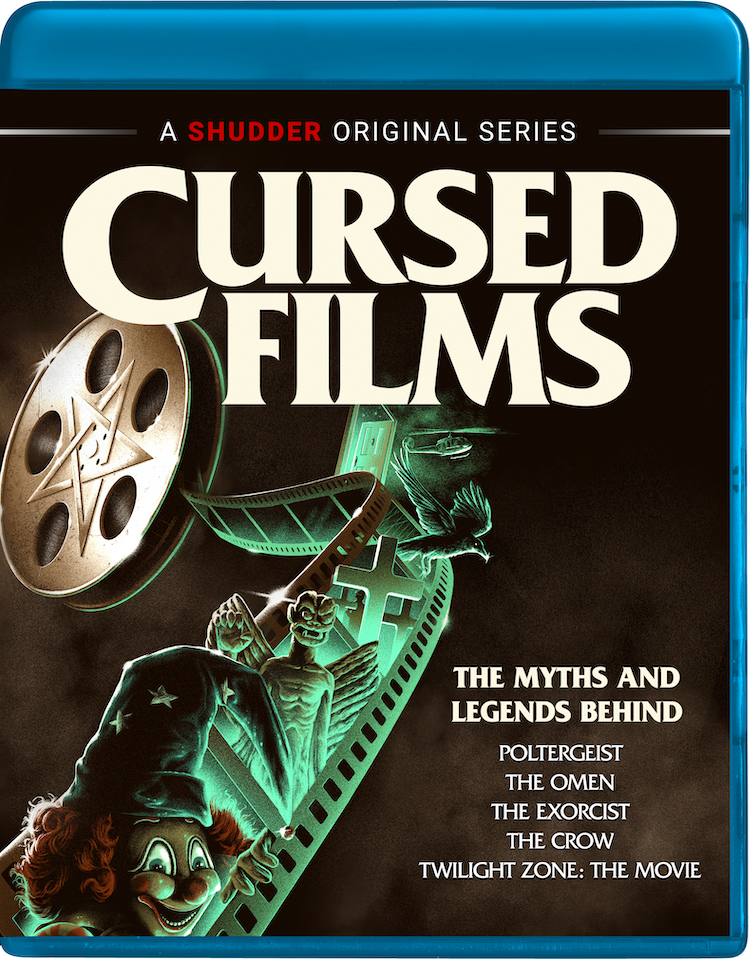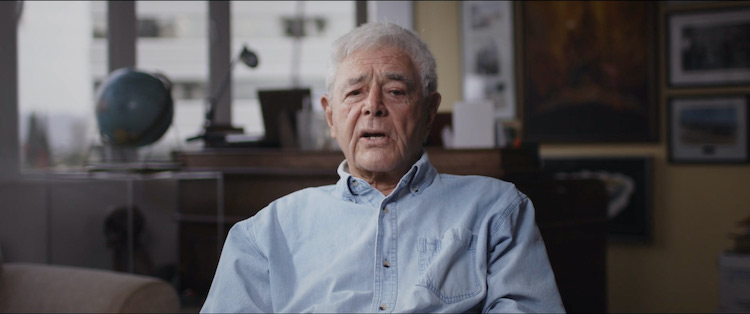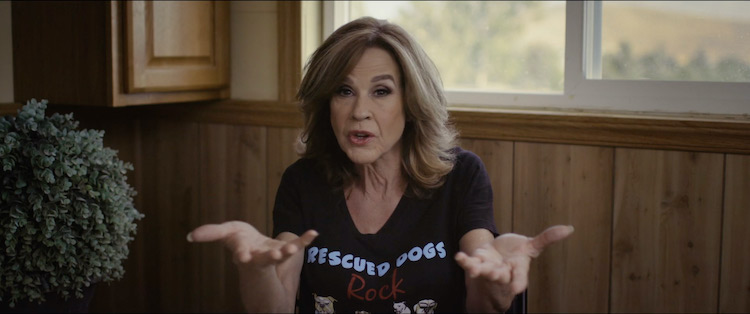Shudder subscribers may have already seen the documentary series, CURSED FILMS, but the five-part series recently released on Digital, DVD and Blu-Ray this week, enabling those of you who don’t have access to the horror streaming site to check it out. The series provides an absorbing analysis of films that are believed to have been cursed because of events that occurred on set or with cast members. The series proves so much more than what I expected so I was delighted to have the opportunity to speak with both director Jay Cheel and interview subject Mitch Horowitz.

I always like to know the backstory of any characters, so I asked each to share their origin stories.
Jay: “Well, I think the attraction to documentary filmmaking weirdly would go all the way back to being home sick from grade school and spending the afternoon with my grandmother watching nature documentaries or even cooking shows or Bob Ross, shows that presented some sort of reality that was attractive to me, for whatever reason. This idea that you could tell a real story with real people in a cinematic way was exciting to me. As a genre film fan, being able to pull genre influences into documentary filmmaking is a fun challenge, so I think that’s kind of where it came from.
“Eventually, I went to film school and spent some time working for a video game developer right outside of film school. While I worked for them, I started making their developer diaries, their behind-the-scenes videos that they would release to advertise the game that they were working on. During my time there, I started filming my first feature documentary, BEAUTY DAY, on the side. Eventually, that got some interest, and I left the video-game industry for good and went down the path of what I actually wanted to do, which was to become a filmmaker.”
Mitch: “I’m a historian of alternative spirituality, and I often refer to myself as a believing historian because I approach my topics with critical sympathy. I do take seriously the practice of religion, including religion of an occult or esoteric variety. The truth is most historians of religions are what could reasonably be called believing historians. They just don’t advertise that fact because they think it might compromise the appearance of some sort of objectivity. When I was a kid, I was growing up in the borough of Queens in the 1970's, and I was fascinated with superstition and folklore, newspaper horoscopes, Bigfoot, flying saucers, and I wanted to start to peel back the pages of these things and ask, “Where did these beliefs come from?” For example, all of us know our [astrological] sun-sign and could probably describe something about it, even people who would describe themselves as hardened skeptics. It’s kind of interesting because sun-sign astrology in its earliest form goes back to ancient Babylon. Why are those of us walking around today in the 21st century even aware of what it means to be a Pisces or a Libra or a Sagittarius? Yet we all are, regardless of what our background or degree or belief is, so I just wanted to ask myself, “How did these ancient ideas, these ancient religions, remain relevant in one way or another for us today?”
Regarding the genesis for CURSED FILMS, Jay had the following to say:
“The project was brought to me through Owen Shiflett who was at Shudder at the time. He thought I would be a good fit for it because I’m a horror fan and a documentary filmmaker. I had just finished a short documentary called TWISTED, which was about an urban legend about our local drive-in theater which was hit by a tornado supposedly while the movie TWISTER was playing, and the screen that TWISTER was playing on was blown away. I did a short documentary looking at that urban legend and where the truth kind of lied in that and the nature of memory. That kind of worked as a nice proof-of-concept for what CURSED FILMS could be, so Owen brought it to me, and I pitched my take on the show, and they liked it, and it went from there.”
Mitch explained how he became involved.
“Well the director Jay Cheel was committed to exploring the question of cursed films in a very methodical way. He doesn’t approach the topic from a perspective of belief, in terms of there really being such thing as a curse or a cursed film set, but from a perspective of wanting to impact the forensics, both culturally and physically, into what went wrong on these film sets. In this case, I don’t want to appear as an advocate or a believer in the premise that any of these movies are cursed, but I do take seriously dimensions of belief. I do take seriously the question of an extra-physical dimension to life, and he already had people who were participating in the series who would be considered hardened skeptics. I think he wanted somebody who would approach the topic from a perspective of critical sympathy, and that’s me, so he requested my participation. I am a horror movie fan. I have been ever since I was a little kid, so I was delighted to participate.”
Jay didn’t get excited about covering any particular film over the others, but he did derive some glee from working on this project.
“Getting to go to the POLTERGEIST house for that episode was exciting, [as was] getting to meet Richard Donner or getting to hang out with Linda Blair and ask her questions. I would say, across the board, [the series] was just a lot of fun to film. It basically was just getting together with fans of the films where we could share our passion for horror and for filmmaking. Also, getting to talk to the people who were involved in the production of some of my favorite films was just a great experience overall.”

I noticed the episode order for the Blu-Ray is different from the order on Shudder, so I asked Jay about it and any other differences from what runs on Shudder’s platform to the hard media.
“The order on the Blu-ray was the intended order. I’ve been saying there’s the idea of a director’s cut Blu-Ray; this is the director’s order Blu-Ray. The way in which it was released on Shudder was kind of dictated by the fact that they had THE EXORCIST on the service for a month, so they wanted to put The Exorcist episode as the premiere to coincide with the film premiere, and so that kind of shuffled the order of the episodes, which is fine. I’m obviously more than thrilled to have the show on the service at all, but the Poltergeist episode was kind of the intended first episode just because I think it establishes what the show is in a great way and feels like a first episode, rather than throwing you into the deep end with The Exorcist and our “real” exorcist doing exorcisms on people. I think someone could come into the series with that episode and not be sure tonally where we’re coming from or that the show is even taking a sort of rational perspective, so yeah the order on the Blu-ray, I think for me at least, feels a little more like a proper arc.
“There is a commentary track for every episode, which hopefully will be enlightening on some level. People get to hear my monotone, dull voice over top of 2 ½ hours of material, so whether that’s a selling point, I will leave it up to you to decide. But, yeah there’s some interesting stories behind the making of the show as well, in terms of just getting some of the people to agree to be in it, what we experienced, and my own personal connection to these films that hopefully people will find enlightening and entertaining.”
The series takes a more logical approach to the idea of curses in relation to these films, so I asked Jay to discuss his decision to examine the material from a rational versus superstitious lens.
“I mean I guess I’m a skeptical person. I don’t believe in any way that any of these films were actually cursed, but I was curious to see how that would work if a film was cursed. Does it mean someone would actually have to curse it from afar, or could the curse be brought upon the subject matter of the film itself? As much of a skeptic as one might claim they are, they are likely to engage in a lot of magical thinking in their day-to-day lives that seems on the surface like it’s just a part of the routine, but it might not be too far off from thinking that the use of a biological skeleton on a film set could end up cursing a production. Whatever superstitious routines we might have in our daily lives and contrasting them to some of these supernatural claims was kind of an interesting idea to me. Also, just as a documentary filmmaker, I wanted to dig a little bit beyond just the Internet list approach of “top five most cursed films” and get at something that might be a little more valuable than that, and have people walking away having had fun going through all of these stories connected to these films, but maybe actually learning something or widening their perspectives.”
My last question to Jay was to ask how making the series changed his perspective or opened his mind.
“Coming out of it, I certainly still don’t believe that the films were cursed or that you can curse a film. But, you know I spoke with someone named Mitch Horowitz, who is an occult historian. He has a very grounded perspective on all of this, and he is very articulate. Talking to him, I think I kind of walked away with this - it’s almost like shifting from being an atheist to an agnostic, although I don’t claim to be an atheist. Just this idea that we don’t know everything, and there are many things out there that are unexplained. While I don’t think that the explanation is that there is some supernatural force guiding these unusual coincidences, it certainly left me not being as dismissive of certainly how strange and unexplainable the universe is and how we try to make sense of it. I think that’s the most interesting part of the whole series is just looking at how these stories affect us, and how we try to make sense of losing a loved one unexpectedly and try to pull in these explanations that might make us feel a little more at ease. That was kind of what I walked away with, not new understanding, but maybe a broader perspective.”
Speaking of Mitch, he had some interesting thoughts when I asked about what he might do differently had he been in the director’s chair.
“I think that when you’re working on a series like Cursed Films, you’re asked to evaluate the question of belief within a very tight parameter. If someone said to me, “Do you believe these movies are cursed? I would say, “No.” If someone said to me, “Do you believe there’s any such thing as a curse?” I would say, “I won’t rule it out.” I do take seriously that ritual and belief are legitimate practices whether in the mainstream faiths or in the alternative spiritual culture, the occult culture, so when you’re addressing the question about a curse, it can go in broader and different directions. In this particular case, I share Jay’s perspective that these films were not cursed, sort of victims to very human tragedies, tragedies, that in some cases were altogether avoidable, which I think he does a good job of demonstrating.
“There were a couple of folks interviewed who definitely fall on the skeptical end of the scale, and they will talk about things like confirmation bias and all of us being programmed to experience the outcomes that we accept, and that’s legitimate enough, but my argument with some of the skeptics is that they don’t apply their thinking to themselves. If you’re going to apply so-called confirmation bias to somebody who might be considered a believer, then you as a social critic or a social scientist are obligated to apply the same standard to yourself. We all have blind spots whether we lean to belief or disbelief, and I think that’s a conversation that I probably would’ve engaged in more fully. We all have a tendency to want to see things work out in such a way that it conforms to what we already believe. It’s just human nature.”
I wanted Mitch’s opinion on the series and asked about his favorite episode and what moment in the series resonated the most with him.
“To be frank with you, my favorite episode is Twilight Zone: the Movie, which is an episode that I’m not in, and the reason why is because I think Jay does a magnificent job in that episode of demonstrating how sheer hubris caused the loss of life on that set. I think Jay walks through it, step by step, in such a way that shows us that this disaster could’ve been averted, so to me that’s the great morality tale of the whole series. Human tragedy is rarely a matter of curse but often a matter of hubris.
“I think the moment in the series that most strongly resonated with me was in The Exorcist, in which I participated. Linda Blair, when she was still a child actress, was subject to a fair amount of harassment after THE EXORCIST was released because people had this irrational disdain for her as a young girl, having seen her on the screen involved in these profane situations, and some people were irrationally incapable of separating artifice from the individual. There were people who demonstrated an unhealthy obsession towards her and perhaps would’ve endangered her if they could’ve gotten near her. When Jay asked her to discuss it, she refused. She refused, and I thought that was revealing. I thought that was telling. One can only imagine the pain that that must’ve caused her as a kid. We spend all our lives trying to reach for certain goals or attainments, and sometimes we get them, and they come with things that are unexpected and painful. I just was struck by the brevity, and I think the honesty of her remark. It just evoked to me how difficult and frightening that must’ve been for a 10-year-old kid.”

Regarding his overall experience, Mitch had this last comment:
“I must say it was an extremely heartening experience for me because it was probably one of a handful of documentaries in which I’ve participated where there was no sensationalism whatsoever, and it is proven to be commercially successful. In that sense, I think it raised the bar on these kinds of projects, and I found it a bit of a morale boost that a documentary that made no concessions to sensationalism can be commercially successful, and I think it something that the industry should take note of.”
CURSED FILMS is a genuinely interesting series that combines a look behind the scenes, fandom in its many forms, and some interesting takes on curses and the supernatural. It confronts the tragedies surrounding these films head-on, with some episodes being more emotionally impactful than others. I cried through at least half of the Twilight Zone: the Movie episode because I suffer from extreme empathy, and everything about it just broke my heart. I'm intrigued about the commentary available on the Blu-Ray. Despite what Jay says, I didn't find his voice all that monotone or dull, and I believe there's bound to be something worthwhile in what he has to say.
